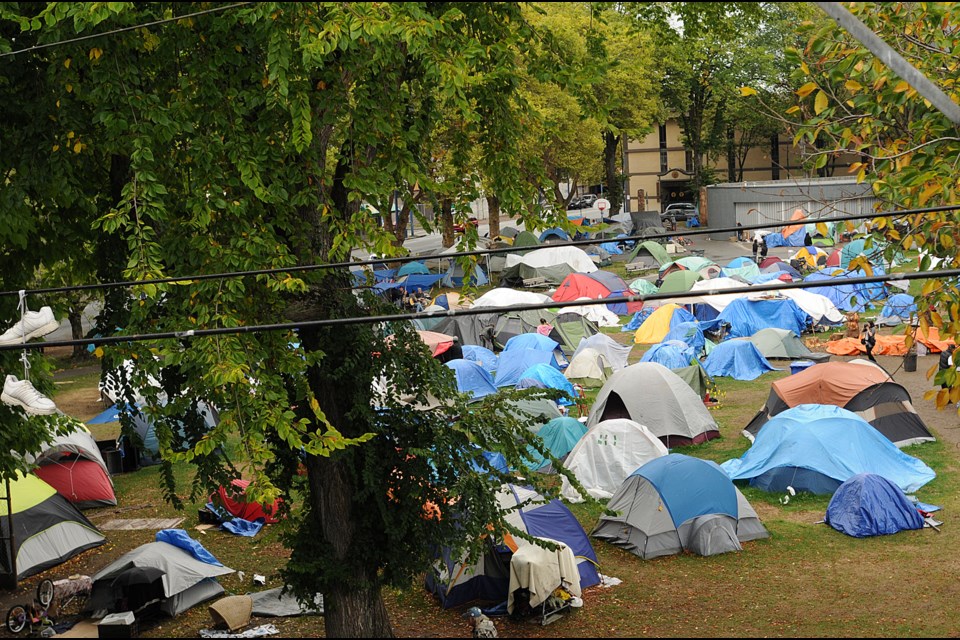The City of Vancouver announced Thursday that it will seek an injunction in B.C. Supreme Court to begin dismantling the tent city at Oppenheimer Park.
The camp, which has more than 200 tents covering the grounds at Powell and Jackson streets, was set up in the summer by homeless people and activists in protest of inadequate and lack of housing.
"The weather is turning now, the condition of the camp has deteriorated quite significantly in recent days, and with the temperature dropping, we are only going to see conditions get worse," Mayor Gregor Robertson told reporters. "We've seen a real shift and deterioration of leadership... and there's a real challenging situation there now — as we saw with Occupy — of people moving into the site who aren't homeless but are causing more trouble."
The city's application will be heard Monday and its lawyers are expected to argue the camp has been in violation of the city's park bylaws. Camping is not allowed and neither is creating structures. Though more than 200 tents were pitched in the park Thursday, it is unclear how many people are actually homeless.
Brody Williams, one of the founders of the camp and named in the city's court injunction, said he was disappointed with the city's legal action. Williams, who lives in a studio apartment near the park, said many people will likely remain defiant and stay in the park, if the city is granted an injunction.
"It's kind of ruthless and insensitive," he said, flipping through the pages of the city's application at the park Thursday. "This is a mayor [Gregor Robertson] that's just trying to hide a problem. Shame on him because his platform to become a mayor was to end homelessness and it's gotten worse instead of better."
Earlier this year, city council unanimously passed a motion to "formally acknowledge that the city of Vancouver is on unceded traditional territory of the Musqueam, Squamish and Tsleil-Waututh First Nations.” Many of the campers are First Nations and set up a "sacred fire" and sweat lodge, which are no longer at the park.
When asked about the significance of the motion, Robertson said it wasn't a factor in the protest.
"The Musqueam chief [Wayne Sparrow], in particular, was very clear that this encampment had nothing to do with Musqueam land," the mayor said. "I've been in touch with the chiefs and we've had over nine weeks of clarity that this is not the case. The unceded issue is really a separate issue I think was dismissed by the three First Nations locally."
The city announced this week that it reached a deal to open 157 units of temporary housing in the former Quality Inn at 1135 Howe St. that will open in November. Also, the city created another 70 shelter spots by transforming the former Kettle of Fish restaurant into a shelter and finding space at the Union Gospel Mission.
"No one wants a mat, no one wants a shelter — it's not a solution," said Williams, noting the purpose of the camp was to pressure governments to find permanent homes for people. "We want quality, safe, low-income housing."
Over the past nine weeks, the city said, 40 homeless campers were moved into housing. A further 50 people remain on the wait list for housing and upwards of 50 more may also be homeless at the park, the city said.
The city also noted two new social housing buildings at Broadway and Fraser and 111 Princess St. are scheduled to open in mid-October. A third one, Taylor Manor on Adanac at Boundary, will open in December. The total number of units for all three equals 249.
Though the city's homeless population continues to fluctuate, a homeless count conducted in March recorded 1,803 homeless people in Vancouver, with more than 500 living on the street and the rest in some form of shelter.
It's the largest homeless population in the city's history.
with files from Andrew Fleming.
mhowell@vancourier.com
twitter.com/Howellings



